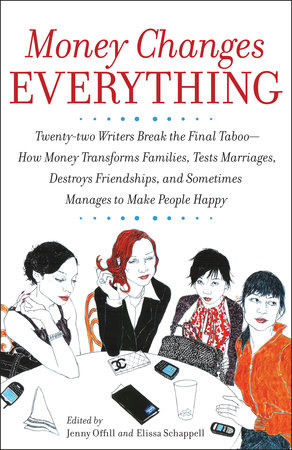Money Changes Everything Reader’s Guide
By Jenny Offill Elissa Schappell


1. Tales of failed marriages, substance abuse and family dysfunction are talk show staples in America. Given this culture of confession, why is talking about money still such a taboo?
2. The American Dream promises that anyone who works hard enough can have a rags to riches success story. Do you think this is true? Is the American Dream still an achievable ideal?
3. What does it mean to be middle–class in America? How has this definition changed over the years?
4. Economists note that middle–class Americans are now carrying record levels of credit card debt. What do you think leads people to take on more financial liability than they can handle? Do you see debt as the sort of misfortune that could happen to anyone or as a weakness of character?
5. Discuss common generalizations about “the poor” and “the rich” in our society. Are these assumptions based on emotion or fact?
6. In “My Inheritance”, Meera Nair explores the tangled history of how money and land have been passed down through three generations. Have the terms of an inheritance ever caused a rift in your own family?
7. In “The American Dream”, Isabel Rose describes the difficulties of dating as a wealthy heiress. Men who had less money than she did often felt defensive about being “kept” while men who came from the same sort of background disliked that they couldn’t impress her with their lavish gifts. Have you ever been involved in a romance that faltered because of a disparity in finances?
8. In “Nouveau Poor”, Ruth Konigsburg writes about passing as rich when in fact her family was barely paying the bills. Claire Dederer writes about the opposite situation: keeping mum about her secret “stash” so as not to seem like a trust fund dilettante. Have you ever felt the need to misrepresent your financial status? If so, why?
9. In “The Perilous Dune”, Jay McCulloch reminisces about her charmed childhood growing up on Park Avenue, and yet she was embarrassed enough about her address to hedge about where she lived. Are such lies necessary? Will wealthy people who admit their good fortune find themselves taken advantage of?
10. In this same piece, McCullough writes about coming to terms with the realization that she cannot offer her children the same level of comfort and security her family provided her. Do you think hers is a common experience in this day and age?
11. Financial difficulties are the number one cause of divorce in America. In Fred Leebron and Katherine Rhett’s paired essays, the couple describes how their own differing attitudes towards money have shaken their marriage over the years. What role has money played in your own intimate relationships? Why is the vow “for richer or poorer” so hard to keep?
12. As we see in both Charles D’Ambrosio’s and Jonathan Dee’s essays, our parents’ relationship to money greatly informs our own. In what ways did your family’s attitudes about money influence you? In what ways have you broken away from their values?
Just for joining you’ll get personalized recommendations on your dashboard daily and features only for members.
Find Out More Join Now Sign In